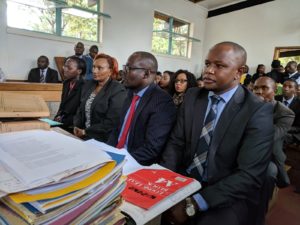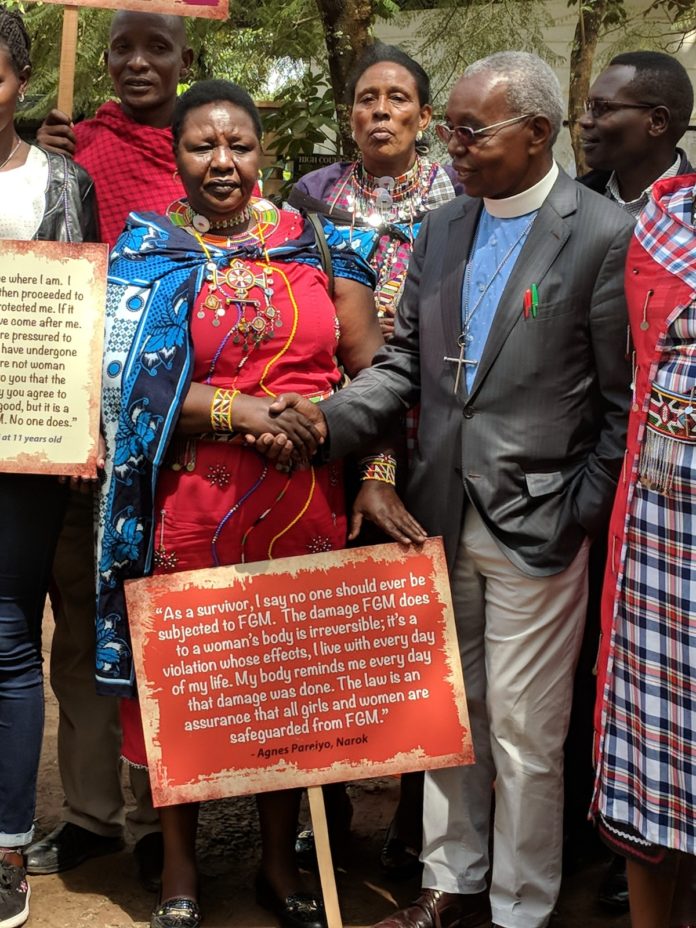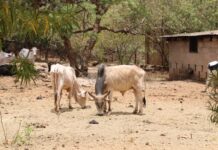|
Getting your Trinity Audio player ready...
|
By Winnie Kamau
A silent protest by Activists against Female Genital Mutilation (FGM) was witnessed outside the Machakos High Court during the mention of a case lodged by Dr. Tatu Kamau.
Dr. Tatu moved to court seeking to legalize FGM, by filling a constitutional petition seeking to render the prohibition of Female Genital Mutilation Act unconstitutional. The Law came into force in 2011 and criminalizes the harmful cultural practice, common in most communities within the country.
The activists used the muted protest to iterate their support for the prohibition of Female Genital Mutilation Act, 2011.
They were holding placards bearing the personal stories of survivors of FGM and those who escaped the cut. On the posters were stories of adult women and young girls under 18 whose names were anonymous, but their stories brought to fore the harmful effects of FGM.

Among the Kenyans at the court precincts was Rev. Dr. Timothy Njoya who is synonymous with Kenya’s second liberation, alongside Agnes Pareiyo, the founder of Tasaru Ntomonok Initiative (TNI), a safe house for girls who escaped or are survivors of FGM and child marriage in Narok.
Njoya who has written a book titled the Divinity of the clitoris explained why he was against FGM, noting that he had experienced first hand through his Mother, Wandia who escaped FGM in 1925 and went to the Tumutumu Church of Scotland mission in search asylum, education and eternal excellence.
“We should keep the clitoris where God fixed it, do not remove it.” Said Njoya
Sentiments echoed by Agnes Pareiyo who was nicknamed ‘the lady with a wooden vagina’ for using a wooden carving of the female genitalia to teach her community about the dangers of FGM and child marriage.
“On the issue of consenting women over 18 years, being allowed to undergo FGM, we say a big no to this attempt to legalize FGM, through the consent loophole which risks being introduced, women will continue being oppressed due to lack of awareness on the irreversible effects of FGM and poverty. We want the law to be upheld, we want women & girls to live healthy lives from FGM.” Said Pareiyo
The two end FGM advocates met for the first time at the court premise, but they spoke the same language, that of protecting women and girls from a harmful cultural practice, which has no health benefits Their call was that of upholding the law which not only deters would be perpetrators but ensures that victims and survivors access justice and girls and women are protected from the extreme violence against women and girls.
The demonstrators had earlier attended the court session, where the self-representing petitioner called on Justice David Kemei, to intervene owing to the endless number of expert affidavits she was receiving from Kenyans.
“I just received another one here; I don’t know when this will stop because I am beginning to get tired.” said Dr. Tatu Kamau

Justice Kemei responding to Tatu noted, “This is a case of public interest and anyone who wants to say something will not be locked out.”
Kemei further warned Kiplagat arap Koech who is supporting Tatu’s petition to ensure that he follows the court procedures following his request to be admitted as an interested party.
“This is not a court of public opinion or a public baraza, it is a court bound by procedures” noted Justice Kemei
The anti-FGM campaigners allege the move to repeal the Prohibition of FGM Act,2011 is meant to water down the gains made over a decade in ensuring that the rights of women and girls to a positive cultural context and against harmful practices are upheld.
Interested parties against the petition include Kenya Women Parliamentary Association (KEWOPA), Equality Now, KELIN, Amref Health Africa, Samburu Girls Foundation, the Federation of Women Lawyers, Msichana Empowerment, the Centre for Rights Education and Awareness Africa, the Katiba Institute, the Office of the Director of Public Prosecutions and Men for the Equality of Men And Women.
The case will be mentioned on June 11th, 2018














